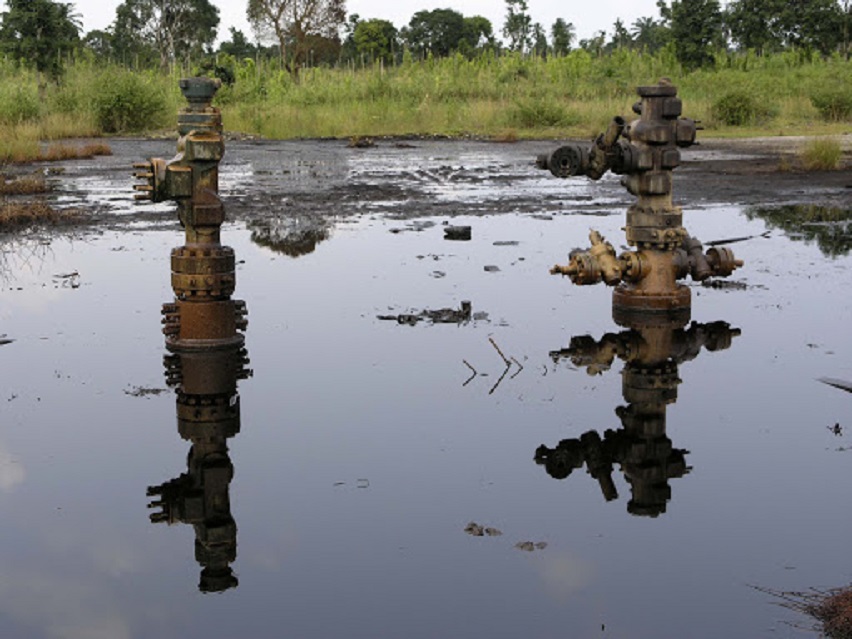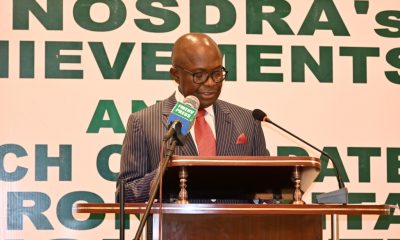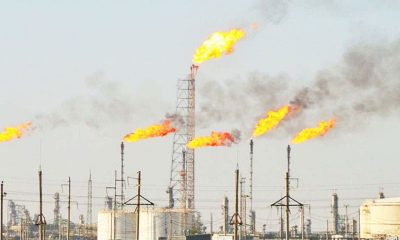Economy
Nigeria’s Response to Oil Spills Poor—NNRC

By Adedapo Adesanya
The Nigeria Natural Resource Charter (NNRC) has disclosed that Nigeria is currently suffering from poor response to oil spill and lack of capacity of government’s agencies to tackle environmental issues.
The NNRC said this in a presentation by its Program Coordinator, Ms Tengi George-Ikoli, at a webinar titled Nigerian Oil Spill Detection and Response Agency (NOSDRA) Amendment Bill: Reducing environmental degradation through improved oil spill response.
According to Ms George-Ikoli, NOSDRA, the agency set up to address some of the grave consequences of oil exploitation, which is also mandated to respond to oil spills, was currently hampered by an almost debilitating lack of capacity.
She further stated that there is currently poor response to oil spills because of NOSDRA’s lack of capacity, adding, however, that the capacity gaps in NOSDRA were not due to a lack of expertise but lack of funding and punitive powers.
Ms George-Ikoli lamented that oil exploitation had always presented a huge negative impact on the ecosystem of the Niger Delta region, giving rise to intense land degradation, rapid agricultural decline, fisheries depletion, rampant and destructive oil spillages, continuous gas flaring and toxic water contamination among others.
This, she added, had negatively affected the health, environment and livelihoods of the Niger Delta people.
In her words, “Oil exploitation is now ongoing in the Lagos-Badagry region and now we have discoveries in the Northern part of Nigeria. All over Nigeria, oil exploitation grows, but we must note that as the benefits grow, the resultant negative externalities grow as well.
“The oil age like the coal age and the stone age will at some point set. States that contributed to the coal age in Nigeria are now left to their devices with the shift to oil. What happens to the Niger Delta region with the shift towards alternative energy sources or to other regions in Nigeria where oil is being exploited? The Niger Delta will be left with its diminished livelihoods, health and environment.
“This is no longer theoretical, as we saw with the COVID-19 health crisis that swept the globe. The Niger Delta concerns were not as high on the priority list. This is the reality that the Niger Delta will face with the zero oil scenario.
“In April 2010, the entire world watched in awe as the 4.9 million barrels of oil spilled into the Gulf of Mexico after an explosion on BP’s Deep-water Horizon drilling rig unfolded. The seriousness of the issue was underlined with the numerous visits of the former United States President, Barack Obama and Congressmen to the spill sites.
“In less than two months after the spill, the American government was able to extract a huge sum of $20 billion from the spiller to mitigate the immediate impact of the spill on the environment.
“However, there were spirited efforts to clean the environment and stronger indications that the $20 billion may only be a preliminary appeasement. What would be and what has been the computation of the penalties for similar spills in Nigeria? Will NOSDRA be able to address similar large scale spills effectively?”
She further called for the speedy passage and assent to the reviewed NOSDRA amendment bill, stating that the bill would ensure that NOSDRA was well equipped to tackle all tiers of oil spillages in the Nigerian environment in line with global best practices.
“As we seek to understand the NOSDRA Amendment bill, President concerns, the address of those concerns, we will encourage the government to collaboratively resolve any outstanding issues to ensure the interests of the Niger Delta people and all other exploited regions are protected,” Ms George-Ikoli appealed.
On his part, Mr Sam Kabari, a Lecturer in Environmental Management and Pollution Control, Nigeria Maritime University, Okerenkoko, Delta State, stated that the country needed a NOSDRA which functions as an environmental regulator in the issuance of guidelines and standards and able to address all manner of spills, noting that at the moment, NOSDRA can only detect oil spills but cannot respond.
He further stated that at present, NOSDRA lacked powers to respond to Tier 3 spills, which is between 250 barrels onshore and 2,500 barrels offshore; was dependent on oil companies for logistics, among others.
Mr Kabari said: “As a nation completely dependent on oil and gas, we need an environmental management umpire. The current regulatory framework restricts NOSDRA from achieving that function. The NOSDRA Amendment Bill will empower NOSDRA to respond to all manners of spills within Nigeria. We have to empower NOSDRA now, or live with pollution even after oil.”
Economy
Tinubu Okays Extension of Ban on Raw Shea Nut Export by One Year

By Aduragbemi Omiyale
The ban on the export of raw shea nuts from Nigeria has been extended by one year by President Bola Tinubu.
A statement from the Special Adviser to the President on Information and Strategy, Mr Bayo Onanuga, on Wednesday disclosed that the ban is now till February 25, 2027.
It was emphasised that this decision underscores the administration’s commitment to advancing industrial development, strengthening domestic value addition, and supporting the objectives of the Renewed Hope Agenda.
The ban aims to deepen processing capacity within Nigeria, enhance livelihoods in shea-producing communities, and promote the growth of Nigerian exports anchored on value-added products, the statement noted.
To further these objectives, President Tinubu has authorised the two Ministers of the Federal Ministry of Industry, Trade and Investment, and the Presidential Food Security Coordination Unit (PFSCU), to coordinate the implementation of a unified, evidence-based national framework that aligns industrialisation, trade, and investment priorities across the shea nut value chain.
He also approved the adoption of an export framework established by the Nigerian Commodity Exchange (NCX) and the withdrawal of all waivers allowing the direct export of raw shea nuts.
The President directed that any excess supply of raw shea nuts should be exported exclusively through the NCX framework, in accordance with the approved guidelines.
Additionally, he directed the Federal Ministry of Finance to provide access to a dedicated NESS Support Window to enable the Federal Ministry of Industry, Trade and Investment to pilot a Livelihood Finance Mechanism to strengthen production and processing capacity.
Shea nuts, the oil-rich fruits from the shea tree common in the Savanna belt of Nigeria, are the raw material for shea butter, renowned for its moisturising, anti-inflammatory, and antioxidant properties. The extracted butter is a principal ingredient in cosmetics for skin and hair, as well as in edible cooking oil. The Federal Government encourages processing shea nuts into butter locally, as butter fetches between 10 and 20 times the price of the raw nuts.
The federal government said it remains committed to policies that promote inclusive growth, local manufacturing and position Nigeria as a competitive participant in global agricultural value chains.
Economy
NASD Bourse Rebounds as Unlisted Security Index Rises 1.27%

By Adedapo Adesanya
The NASD Over-the-Counter (OTC) Securities Exchange expanded for the first session this week by 1.27 per cent on Wednesday, February 25.
This lifted the NASD Unlisted Security Index (NSI) above 4,000 points, with a 50.45-point addition to close at 4,025.25 points compared with the previous day’s 3,974.80 points, as the market capitalisation added N30.19 billion to close at N2.408 trillion versus Tuesday’s N2.378 trillion.
At the trading session, FrieslandCampina Wamco Nigeria Plc grew by N5.00 to trade at N100.00 per share compared with the previous day’s N95.00 per share, Central Securities Clearing System (CSCS) Plc improved by N4.18 to sell at N70.00 per unit versus N65.82 per unit, and First Trust Mortgage Bank Plc increased by 14 Kobo to trade at N1.59 per share compared with the previous day’s N1.45 per share.
However, the share price of Geo-Fluids Plc depreciated by 27 Kobo at midweek to close at N3.27 per unit, in contrast to the N3.30 per unit it was transacted a day earlier.
At the midweek session, the volume of securities went down by 25.3 per cent to 8.7 million units from 11.6 million units, the value of securities decreased by 92.5 per cent to N80.7 million from N1.2 billion, and the number of deals slipped by 33.3 per cent to 32 deals from the preceding session’s 48 deals.
At the close of business, CSCS Plc remained the most traded stock by value on a year-to-date basis with 34.1 million units exchanged for N2.0 billion, trailed by Okitipupa Plc with 6.3 million units traded for N1.1 billion, and Geo-Fluids Plc with 122.0 million units valued at N478.0 million.
Resourcery Plc ended the trading session as the most traded stock by volume on a year-to-date basis with 1.05 billion units valued at N408.7 million, followed by Geo-Fluids Plc with 122.0 million units sold for N478.0 million, and CSCS Plc with 34.1 million units worth N2.0 billion.
Economy
Investors Lose N73bn as Bears Tighten Grip on Stock Exchange

By Dipo Olowookere
The bears consolidated their dominance on the Nigerian Exchange (NGX) Limited on Wednesday, inflicting an additional 0.09 per cent cut on the market.
At midweek, the market capitalisation of the domestic stock exchange went down by N73 billion to N124.754 trillion from the preceding day’s N124.827 trillion, and the All-Share Index (ASI) slipped by 114.32 points to 194,370.20 points from 194,484.52 points.
A look at the sectoral performance showed that only the consumer goods index closed in green, gaining 1.19 per cent due to buying pressure.
However, sustained profit-taking weakened the insurance space by 3.79 per cent, the banking index slumped by 2.07 per cent, the energy counter went down by 0.24 per cent, and the industrial goods sector shrank by 0.22 per cent.
Business Post reports that 25 equities ended on the gainers’ chart, and 54 equities finished on the losers’ table, representing a negative market breadth index and weak investor sentiment.
RT Briscoe lost 10.00 per cent to sell for N10.35, ABC Transport crashed by 10.00 per cent to N6.75, SAHCO depreciated by 9.98 per cent to N139.35, Haldane McCall gave up 9.93 per cent to trade at N3.99, and Vitafoam Nigeria decreased by 9.93 per cent to N112.50.
Conversely, Jaiz Bank gained 9.95 per cent to settle at N14.03, Okomu Oil appreciated by 9.93 per cent to N1,765.00, Trans-nationwide Express chalked up 9.77 per cent to close at N2.36, Fortis Global Insurance moved up by 9.72 per cent to 79 Kobo, and Champion Breweries rose by 5.39 per cent to N17.60.
Yesterday, 1.4 billion shares worth N46.2 billion were transacted in 70,222 deals compared with the 1.1 billion shares valued at N53.4 billion traded in 72,218 deals a day earlier, implying a rise in the trading volume by 27.27 per cent, and a decline in the trading value and number of deals by 13.48 per cent and 2.76 per cent, respectively.
Fortis Global Insurance ended the session as the busiest stock after trading 193.7 million units for N152.7 million, Zenith Bank transacted 120.7 million units worth N11.1 billion, Japaul exchanged 114.8 million units valued at N407.0 million, Ellah Lakes sold 98.4 million units worth N999.2 million, and Access Holdings traded 63.1 million units valued at N1.7 billion.
-

 Feature/OPED6 years ago
Feature/OPED6 years agoDavos was Different this year
-
Travel/Tourism10 years ago
Lagos Seals Western Lodge Hotel In Ikorodu
-

 Showbiz3 years ago
Showbiz3 years agoEstranged Lover Releases Videos of Empress Njamah Bathing
-

 Banking8 years ago
Banking8 years agoSort Codes of GTBank Branches in Nigeria
-

 Economy3 years ago
Economy3 years agoSubsidy Removal: CNG at N130 Per Litre Cheaper Than Petrol—IPMAN
-

 Banking3 years ago
Banking3 years agoSort Codes of UBA Branches in Nigeria
-

 Banking3 years ago
Banking3 years agoFirst Bank Announces Planned Downtime
-

 Sports3 years ago
Sports3 years agoHighest Paid Nigerian Footballer – How Much Do Nigerian Footballers Earn





















